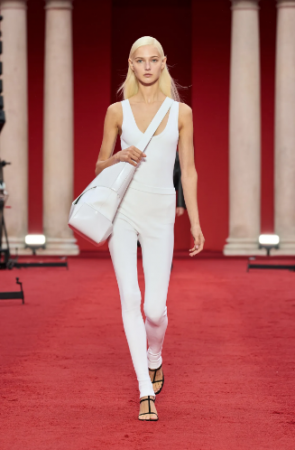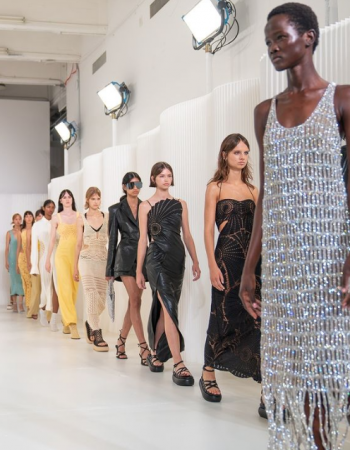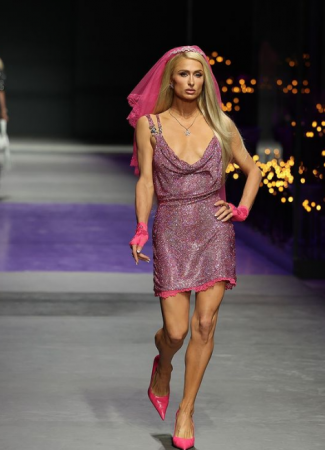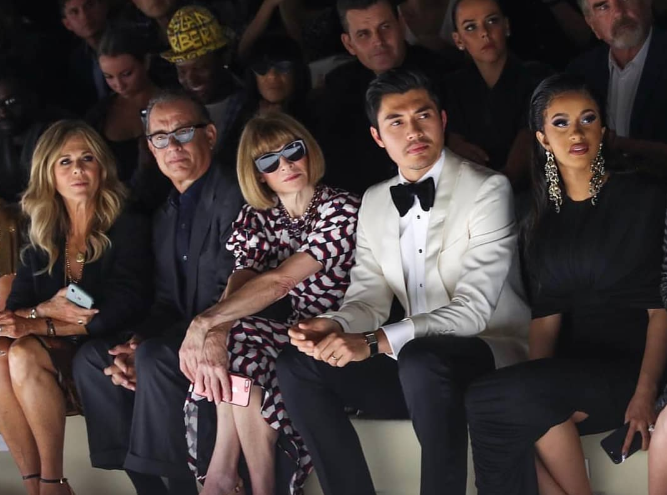For decades, Fashion Weeks have quite literally set the stage in sharing designers’ latest thoughts, theatrics and trends that will, one way or another, filter their way down into the retail (and now, TikTok) abyss.
The burning question since the pandemic cut in-person shows and (even before that) has been whether Fashion Weeks in general (not just New York’s run, but the entire ‘Big 4’) have become outdated.

Ferragamo/Spring 2023 ready-to-wear/ Filippo Fior
The debate naturally came about when people started to look to the internet to tell them what was trending, instead of catwalk opinions.

Jonathan Simkhai/ SS23/ Madi Atkins
The first thread of Fashion Weeks’ relevancy debate, questions whether the shows are actually ahead of the curve they once claimed to create.
The second squints its eyes at whether these glamorized weeks have become little more than obvious publicity stunts.

Versace SS23/ Getty Images
The third, throws question marks at who really sets the trends, and who’s realistically consuming them.
Whether the big budgets spent on the ‘Weeks’ could go elsewhere, ie: to more sustainable and ethical manufacturing processes, is another coin in the conversational fountain.
Expiration date passed for ‘The Shows’? Let’s get into it:
The expired model
In 2017, The Business of Fashion’s Misha Nonoo held a strong belief that the acclaimed weeks had already reached their expiry dates back then. For Nonoo, the model of these weeks simply no longer made sense.
“The truth is: being anchored in a month-long fashion week parade that is often forgotten by the time the product is available for consumers to buy is no longer effective. Whilst the major fashion houses are willing to pump large budgets into staging extravagant shows as marketing spectacles designed to build brand, generate digital content and ultimately push sales of lipsticks and handbags, it’s worth considering whether those budgets could be better spent.”
The influencers took over a long time ago
The ancestors of the modern-day influencer AKA, bloggers, were already starting to challenge the flow of the “the shows” back in the day. As Vox wrote a few years back, they threatened the corners of fashion’s controlled walls.
But it wasn’t long until influencers and designers teamed up. Call it a survival move. Marc Jacobs named a bag after ‘Bryanboy’, a famous blogger in the late 00s and soon other fashion elite followed suit in the collab movement.
What the alliances between the two worlds signalled, was a shift. Suddenly, people were looking at the internet to tell them what mattered in fashion, and the glossy week’s lost their monopoly-sized footing. In the world of influencers, micro-influencer and micro-micro influencers we currently navigate, collabs have become essential for relevancy.
ALSO SEE: Marc Jacobs’ latest Heaven collection has all the stars aligning
There was a time when no one would’ve thought that a reality star would have curated a high-fashion collection – and yet, Dolce and Gabbana has Kim Kardashian at the forefront for the ‘Ciao Kim’ show.
Domenico Dolce and Stefano Gabbana famously called the Kardashians “cheap,” once, so why would the tune change if it wasn’t absolutely necessary?
View this post on Instagram
Fashion Week had to become a digital campaign
As TikTok gives Google a run for its money as the most popular search engine, Fashion Week needed to rely not only on publicity or influencers but the general public’s approval. The answer? Going viral.
If you’re wondering why shows seem to keep turning up the heat on double-take moments (quite literally lately with Gucci’s twin-themed show at Milan Fashion Week) it’s because a lot more stunts are needed than ever before to feed the algorithm. After all, high fashion may sell to the highest buyer, but it’s also public love (and sometimes hate) that keeps designers relevant.
View this post on Instagram
And, in the modern day, some will argue that relevancy is worth a lot more than money. After all, a good show may sell your pieces, but relevancy will sell your pieces to come, and then some.
So, are the ‘Weeks’ still relevant? My answer is yes and no. No, they’re not relevant in telling us what to wear anymore, we have the internet for that (if we care). But if they tap into everything that makes the internet churn, then the answer becomes yes. Confused? So is the fashion world.
ALSO SEE:
Handbag prices have skyrocketed as “investment pieces” take literal meaning
Feature Image: shared by @newyork_fashion.week/ Instagram

